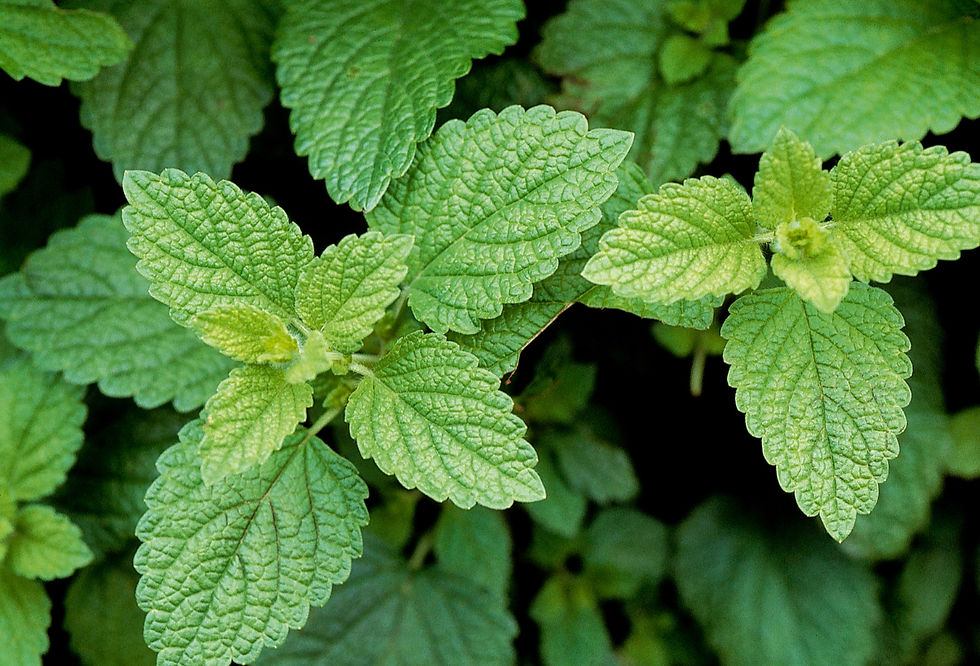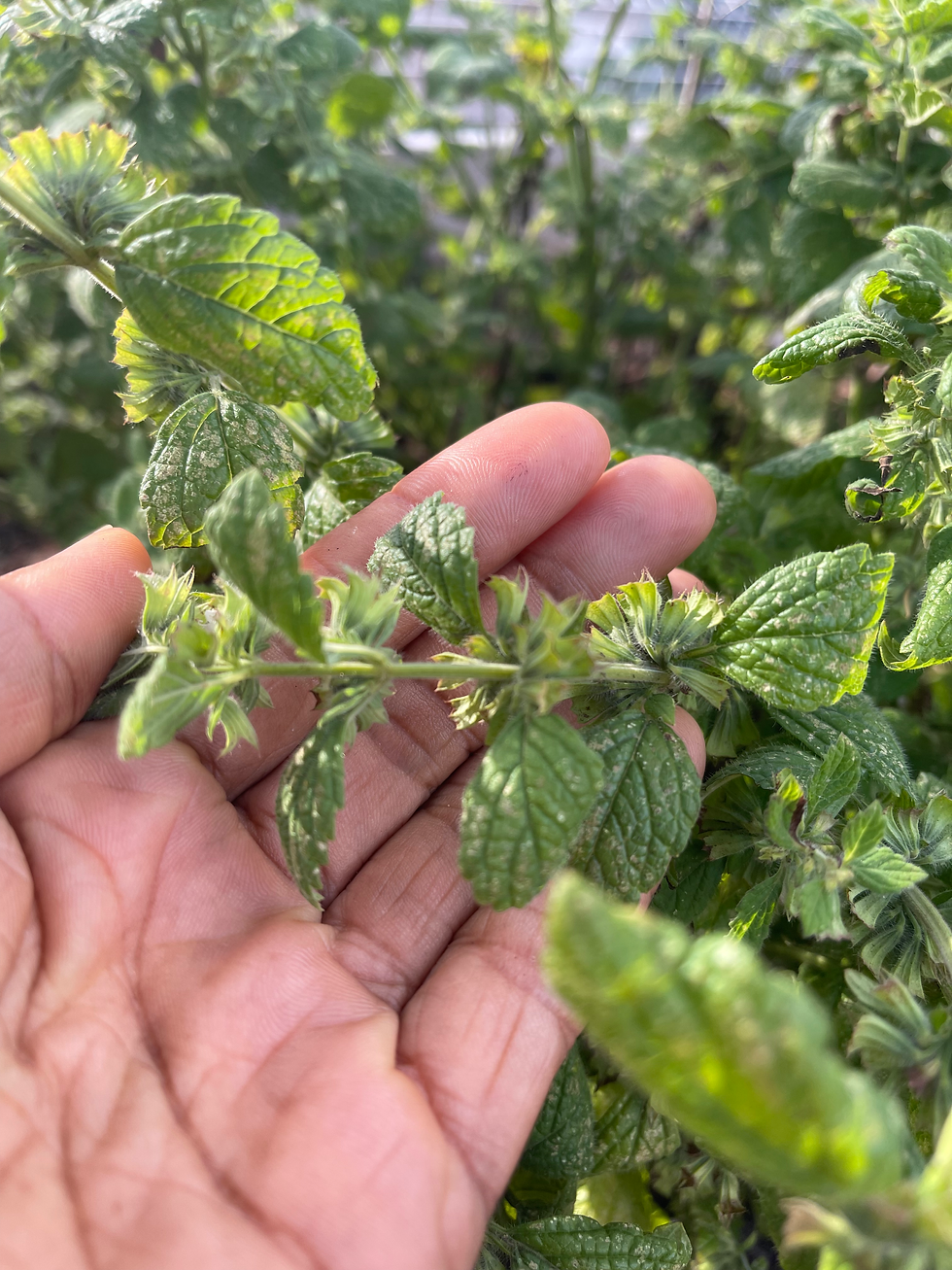Lemon Balm: The Comforting Herb That Soothes Nerves and Tummies
- Lucille Fifield

- Jul 22, 2025
- 4 min read

There are few things more soothing at the end of a long day working in the garden than a steaming mug of herbal tea, especially when it contains my favourite evening blend: mint, lemon balm, and a touch of verbena. The fragrance alone is enough to soften the day’s edges, and with the first few sips, I can almost feel the tension in my shoulders begin to melt away. Lemon balm, in particular, has such a gentle, calming nature – it feels like the herb is giving me a hug from the inside.

If you’ve never met this beautiful plant before, let me introduce you.
A Brief Introduction to Lemon Balm

Lemon balm (Melissa officinalis) is a member of the mint family and has been cherished since
ancient times for its soothing and restorative properties. Its softly serrated, lemon-scented leaves have a tender strength to them, calming the nerves, comforting the digestive system, and even fighting off certain viruses.
Historically used to “gladden the heart,” lemon balm has long been associated with emotional well-being and peace of mind. But beyond the poetic, modern research is beginning to affirm what herbalists have known for centuries.
How Lemon Balm Supports Health [1]
Here at Manna House, we often turn to lemon balm as a gentle but effective aid for many common concerns. Here are a few of the ways it supports the body:

Digestive Harmony
Lemon balm tea may help ease colic and indigestion.
It can relieve bloating and flatulence, especially when sipped alongside meals.
Its mild bitterness stimulates the digestive system, encouraging a gentle detoxifying effect.
Immune Support
Lemon balm has antifungal properties and may help reduce fevers due to its volatile oils.
A cream made from a concentrated lemon balm extract has shown remarkable results in
treating herpes simplex (cold sores), significantly speeding up healing and preventing outbreaks in some individuals.
It may even support recovery from shingles (Herpes Zoster) and help alleviate symptoms of flu.
Nervous System Nourishment
Lemon balm is a known calming agent for the nervous system. It can help reduce anxiety, ease insomnia, and support those struggling with stress-related headaches or migraines.
There’s promising research on its benefits for those with Alzheimer’s disease, with studies suggesting it may improve memory and cognitive function.
Some evidence even points to increased attention span and mental clarity.
Metabolic & Thyroid Support
Lemon balm is rich in antioxidants like rosmarinic acid, which protect cells from damage and support overall vitality.
Fascinatingly, compounds in lemon balm may inhibit the antibodies involved in Graves’ disease, offering natural support for those with this autoimmune thyroid condition.

How I Use Lemon Balm
Personally, I grow lemon balm just outside our kitchen window – not only for easy access but because brushing past it releases such a deliciously calming scent. I harvest the leaves fresh for tea or dry them gently for winter use.
Some nights, my favourite bedtime routine includes a teapot steeped with lemon balm, mint, and lemon verbena. It’s a simple, soothing herbal tea that settles the mind and gently ushers me into restful sleep.
A Note on Safety
As gentle as lemon balm is, it’s always wise to know your herbs. Those with glaucoma should avoid it, as some studies suggest it may increase intraocular pressure. If in doubt, check with a qualified health professional (or feel free to drop us a message at Manna House!).
How Much Should You Use? [1]
If you’re using it therapeutically:
Tea: Steep 30g dried herb in 150ml boiling water and sip throughout the day.
Tincture: 6–9 ml daily.
Capsules: 160–200 mg before bed (for sleep support).
Topical cream: Look for a 70:1 extract in a 1% formulation for cold sore treatment.
Final Thoughts
Lemon balm is more than just a lovely-smelling herb, it’s a gift of peace in a pot. Whether you’re sipping it for sleep, applying it for viral relief, or simply breathing in its fragrance, this humble plant has a quiet way of ministering to body, mind, and soul.
If you’ve never tried it before, I invite you to do what I do: make yourself a cup of lemon balm tea, breathe in deeply, and allow nature’s calm to take hold.
We'd Love to Hear From You
Have you ever used Lemon Balm as a remedy? Perhaps you’ve heard a family story or have a recipe passed down through generations?
Share your experience in the comments below or message us in our community WhatsApp group @ https://chat.whatsapp.com/CRwJToULSYv9SsBVFcAxEl We love hearing how natural remedies continue to bless lives today.
And if you're curious to learn more about how we use herbs like thyme in our residential health programmes at Manna House, why not get in touch or plan a visit?
Sometimes, the most powerful healing starts with a cup of herbal tea and a conversation.
Bibliography
[1] Green Medicine Encylopedia SCIENCE-BASED ENCYCLOPEDIA OF NUTRITION AND NATURAL MEDICINE; https://www.greenmedicineencyclopedia.com




Comments